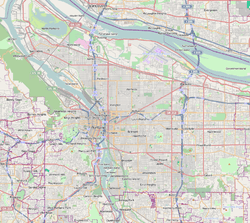Piedmont, Portland, Oregon
| Piedmont | |
|---|---|
| Neighborhood | |
 Piedmont | |
|
Coordinates: 45°34′28″N 122°40′15″W / 45.57444°N 122.67073°WCoordinates: 45°34′28″N 122°40′15″W / 45.57444°N 122.67073°W PDF map | |
| Country | United States |
| State | Oregon |
| City | Portland |
| Government | |
| • Association | Piedmont Neighborhood Association |
| • Coalition | North Portland Neighborhood Services |
| Area | |
| • Total | 0.96 sq mi (2.49 km2) |
| Population (2000)[1] | |
| • Total | 6,427 |
| • Density | 6,680/sq mi (2,581/km2) |
| Housing[1] | |
| • No. of households | 2518 |
| • Occupancy rate | 95% occupied |
| • % households renting | 33% renting |
| • Avg. household size | 2.55 persons |
Piedmont is a neighborhood in the north and northeast sections of Portland, Oregon. The Piedmont subdivision was platted in 1889 by Edward Quackenbush, and promoted in an early flyer as "The Emerald, Portland's Evergreen Suburb, Devoted Exclusively to Dwellings, A Place of Homes." The original subdivision, now known as "Historic Piedmont," includes parts of the Humboldt and King neighborhoods, as well as the modern Piedmont neighborhood south of Rosa Parks Way.
In 1947, after a failed attempt to build a NABISCO factory in the Rose City Park neighborhood, a factory location along Columbia Boulevard was chosen.[2] The plant was completed in August 1950.[2]
In the book, The Zombie Survival Guide by Max Brooks, there is a faux zombie attack recorded in which zombies attacked Piedmont and the citizens attempt to hide in the cave mines.
Features
- Farragut City Park
- Peninsula Park
References
- ↑ 1.0 1.1 Demographics ({{{censusyear|2000}}})
- ↑ 2.0 2.1 MacColl, E. Kimbark. The Growth of a City: Power and Politics in Portland, Oregon 1915-1950. Portland, Oregon: The Georgian Press. ISBN 0-9603408-1-5.
External links
-
 Media related to Piedmont, Portland, Oregon at Wikimedia Commons
Media related to Piedmont, Portland, Oregon at Wikimedia Commons